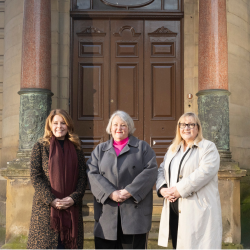-
Study
-
Undergraduate
- Search for a Course
- Undergraduate Open Day & Events
- Application Guides
- Northumbria University UCAS Exhibitions
- Foundation Years
- Undergraduate Fees & Funding
- School & College Outreach
- Continuing Professional Development
-
Postgraduate
- Postgraduate Study Degree
- Postgraduate Research Degrees
- Postgraduate Open Days and Events
- Postgraduate Fees & Funding
- Flexible Learning
- Thinking about a Masters?
- Continuing Professional Development
- Change Direction
-
Student Life
- The Hub - Student Blog
- Accommodation
- Life in Newcastle
- Support for Students
- Careers
- Information for Parents
- Students' Union
- Northumbria Sport
- Be Part of It
-
-
International
International
Northumbria’s global footprint touches every continent across the world, through our global partnerships across 17 institutions in 10 countries, to our 277,000 strong alumni community and 150 recruitment partners – we prepare our students for the challenges of tomorrow. Discover more about how to join Northumbria’s global family or our partnerships.
View our Global Footprint-
Applying to Northumbria
- European Union
- Our London Campus
- Northumbria Pathway
- International Events
- Entry Requirement and Education Country Agents
- Global Offices
-
Northumbria Language Centre
- Faculty Requirements
- Acceptable English Requirements
- Pre-sessional English Language and Study Skills
- Academic Language Skills Programmes (ALS)
-
International Fees, Funding & Scholarships
- International Undergraduate Fees
- International Undergraduate Funding
- International Masters Fees
- International Masters Funding
- International Postgraduate Research Fees
- International Postgraduate Research Funding
- International Money Matters
-
Life at Northumbria
- International student support
- Careers
-
International Mobility
- Current Northumbria Students
- Incoming Exchange Students
-
-
Business
Business
The world is changing faster than ever before. The future is there to be won by organisations who find ways to turn today's possibilities into tomorrows competitive edge. In a connected world, collaboration can be the key to success.
More on our Business Services -
Research
Research
Northumbria is a research-rich, business-focused, professional university with a global reputation for academic quality. We conduct ground-breaking research that is responsive to the science & technology, health & well being, economic and social and arts & cultural needs for the communities
Discover more about our Research -
About Us
-
About Northumbria
- Our Strategy
- Our Staff
- Place and Partnerships
- Student Profiles
- Alumni Profiles
- Leadership & Governance
- Academic Departments
- University Services
- History of Northumbria
- Contact us
- Online Shop
-
-
Alumni
Alumni
Northumbria University is renowned for the calibre of its business-ready graduates. Our alumni network has over 246,000 graduates based in 178 countries worldwide in a range of sectors, our alumni are making a real impact on the world.
Our Alumni - Work For Us
What will I learn on this module?
Children and Culture looks across a range of media and different forms of narrative, including film, television, and print cultures, both fictional and factual, analysing representations of children and young adults. Representations matter as they have an impact upon how groups and individual children are understood by society, contributing to dominant and emergent discourses about youth and childhood. Further, the module will look at the ways in which young people’s use of media, including platforms such as TikTok and Instagram, are discussed and understood. The module will also look at institutions where some of these representations appear, such as museums. The module will challenge preconceptions of diverse groups of children and young people by examining television documentaries, museums, exhibitions and images. Equally, it will look at the shifting patterns in publishing for young people and children in response to the need for more diversity in terms of representation, looking, for instance, at novels, picture books, graphic novels and comics.
How will I learn on this module?
On the MA you are supported by a framework of core and option modules which are designed to aid the acquisition of a wide range of skills generic to the humanities and social sciences and specific to the study of childhood and youth. The aim of this module is to provide you with advanced knowledge, appreciation, and understanding of key issues around culture, media and young people; knowledge of relevant research methods and critical theories; appropriate subject-specific skills necessary for the interpretation of literary and media texts and spaces; and further skills such as communication, self-management, and planning. This will be achieved through interactive seminars discussing key primary texts, but also through discussions around research into, for instance, social media, and finally through discussions following screenings of relevant programmes and films. They will be accompanied by key lectures, also interactive, around major issues and individual texts. On-line resources will be drawn upon to further support discussion.
How will I be supported academically on this module?
The taught sessions act as a scaffold to support your skills and knowledge development throughout the module. There will also be opportunities during each session for discussion with the teaching staff, about both the taught elements and also the assessment. During your study of the module, you will be working closely with a team of academic staff who are keen to support your academic and personal development needs. Through a well-placed support system, we will collectively ensure that you have a successful academic learning journey. The module content and assessment are designed by experienced and research active academic staff whose area of expertise is reflected in the subject specific focus. The academic members of staff responsible facilitates the student-led discussion seminars for each module and is also responsible for grading and providing feedback on formative and summative assessments.
What will I be expected to read on this module?
All modules at Northumbria include a range of reading materials that students are expected to engage with. Online reading lists (provided after enrolment) give you access to your reading material for your modules. The Library works in partnership with your module tutors to ensure you have access to the material that you need.
What will I be expected to achieve?
Knowledge & Understanding:
ML0 1 You will analyse depictions and understandings of childhood and youth in a range of media, institutions and practices.
Intellectual / Professional skills & abilities:
ML02 You will demonstrate an understanding of these texts in the context of cultural practices across wider culture and institutions.
ML03 You will critically analyse key theories of media, institutions and representations in relation to children and young people’s lives.
ML04 You will acquire and become proficient in creative methods.
Personal Values Attributes (Global / Cultural awareness, Ethics, Curiosity) (PVA):
ML05 You will demonstrate ability to articulate creative enquiry around understandings of representations, institutional practices and media in the everyday lives of children and young people.
How will I be assessed?
A formative assessment will take place towards the end of the module to support the development of the summative assessment. You will deliver a verbal and creative presentation to all MA students across the options modules. This will enable you to share your learning with your peers. The formative assessment will cover all module learning outcomes. You will receive peer and tutor feedback.
The summative assessment will be a Creative Portfolio demonstrating that you have met the module learning outcomes. This will be 4,500 words and/or the equivalent. We are encouraging students to be creative on our options module assessments and submit a portfolio which is multi-media, including text, image and/or video and audio content. All four learning outcomes will be covered in the summative assessment. Feedback and grade will be via Turnitin from module staff.
Pre-requisite(s)
Co-requisite(s)
N/A
Module abstract
Children and culture will analyze representations of childhood and youth, how children’s media use is understood and how various institutions represent and support childhood and youth. This research-rich module addresses a range of media and different forms of narrative, including film, television, and print cultures. Further, the module will look at the ways in which institutions, such as museums, address childhood. For instance, Lemn Sisay’s television documentary ‘Superkids’ and his work with The Foundling Museum offer images of care experienced children that challenge preconceptions. Equally, the module addresses professional roles, as shown in, for instance, the shifting patterns in publishing for young people and children in response to the need for more diversity in terms of representation. Representations matter as they have an impact upon how groups and individual children are understood by society, contributing to dominant and emergent discourses. This module may be of interest to those wanting to develop careers in children's media, cultural industries and/or education.
Course info
Credits 30
Level of Study Postgraduate
Mode of Study 1 year Full Time
Department Social Work, Education and Community Wellbeing
Location Coach Lane Campus, Northumbria University
City Newcastle
Start September 2025
All information is accurate at the time of sharing.
Full time Courses are primarily delivered via on-campus face to face learning but could include elements of online learning. Most courses run as planned and as promoted on our website and via our marketing materials, but if there are any substantial changes (as determined by the Competition and Markets Authority) to a course or there is the potential that course may be withdrawn, we will notify all affected applicants as soon as possible with advice and guidance regarding their options. It is also important to be aware that optional modules listed on course pages may be subject to change depending on uptake numbers each year.
Contact time is subject to increase or decrease in line with possible restrictions imposed by the government or the University in the interest of maintaining the health and safety and wellbeing of students, staff, and visitors if this is deemed necessary in future.
Useful Links
Find out about our distinctive approach at
www.northumbria.ac.uk/exp
Admissions Terms and Conditions
northumbria.ac.uk/terms
Fees and Funding
northumbria.ac.uk/fees
Admissions Policy
northumbria.ac.uk/adpolicy
Admissions Complaints Policy
northumbria.ac.uk/complaints














